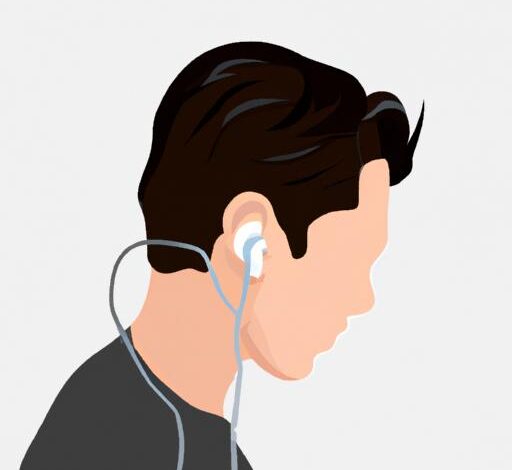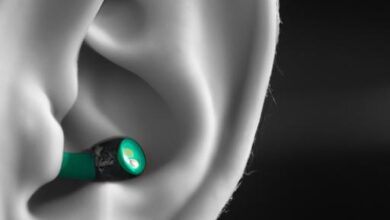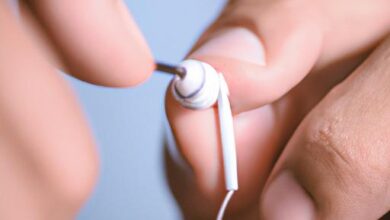Can You Use Earbuds as Hearing Aids?

Earbuds have become a ubiquitous accessory, providing us with the joy of music and audio on-the-go. On the other hand, hearing aids are purpose-built devices designed to assist individuals with hearing impairments. But can earbuds be a substitute for hearing aids? In this article, let’s delve into this intriguing question and explore the differences between these two audio companions.
A. The Popularity of Earbuds and Hearing Aids
In today’s fast-paced world, earbuds have gained immense popularity. They offer convenience, portability, and a personal audio experience. Whether we’re commuting, working out, or simply relaxing, earbuds have become our trusted companions, delivering a world of sound directly to our ears.
Meanwhile, hearing aids have long been an essential tool for individuals with hearing loss. These medical devices are meticulously designed to amplify sounds and improve the overall listening experience. With advanced technologies and discreet designs, hearing aids have transformed the lives of millions, allowing them to actively engage in conversations and enjoy the beauty of sound.
B. Exploring the Topic of Using Earbuds as Hearing Aids
Now, let’s dive into the intriguing concept of using earbuds as hearing aids. As both devices operate by delivering sound to the ears, it’s natural to wonder if earbuds can provide a similar level of assistance as dedicated hearing aids. The idea of using our beloved earbuds to address hearing impairments seems tempting, but it’s crucial to understand the potential limitations and risks involved.
C. Understanding the Differences between Earbuds and Hearing Aids
To make an informed decision, it’s vital to grasp the distinctions between earbuds and hearing aids. While both devices have similarities in terms of delivering sound, the underlying technologies and functionalities differ significantly. Earbuds are primarily designed for recreational audio consumption, focusing on delivering high-quality music and other entertainment content. On the other hand, hearing aids are professionally calibrated devices that address specific hearing needs, aiming to amplify and clarify sounds to enhance the user’s ability to hear and communicate effectively.
In the following sections, we will shed light on whether earbuds can truly serve as a substitute for hearing aids and explore the factors to consider before making such a decision. So, let’s embark on this enlightening journey and uncover the truth behind using earbuds as hearing aids.
Can Earbuds Be Used as Hearing Aids?
A. Exploring the Potential of Earbuds as an Alternative to Hearing Aids
The idea of using earbuds as a substitute for hearing aids may seem appealing, especially considering their widespread availability and affordability. However, it’s important to approach this concept with caution and understand its limitations. While some individuals with mild hearing loss might find temporary relief using earbuds, it’s essential to consult with a qualified audiologist or hearing healthcare professional before considering this option. They can provide guidance based on your specific hearing needs and recommend the most suitable solution.
B. Factors to Consider before Using Earbuds as Hearing Aids
Before deciding to use earbuds as hearing aids, several factors need to be taken into account. Firstly, it’s crucial to accurately determine the extent and type of hearing loss you’re experiencing. Earbuds primarily focus on delivering high-quality audio, which may not address the specific amplification needs of individuals with hearing impairments. Additionally, earbuds lack the personalized programming and customization options provided by dedicated hearing aids, which are tailored to individual hearing profiles.
Furthermore, consider the importance of seeking professional advice. Audiologists and hearing healthcare professionals possess the expertise to assess your hearing condition comprehensively. They can provide a thorough evaluation, offer personalized recommendations, and guide you towards the most effective solution for your specific hearing needs.
C. Limitations and Drawbacks of Using Earbuds for Hearing Assistance
While earbuds may seem like a convenient alternative, they come with significant limitations when it comes to addressing hearing loss. Earbuds are not specifically designed to compensate for hearing impairments, and relying on them as a long-term solution could lead to further deterioration of your hearing health. Earbuds lack the sophisticated features found in hearing aids, such as background noise reduction, feedback cancellation, and directional microphones, which are essential for enhancing speech intelligibility and overall sound quality.
Moreover, earbuds may not provide the necessary amplification across different frequencies, making it difficult to hear and understand certain sounds. Additionally, earbuds can exacerbate existing ear conditions or discomfort due to prolonged usage, as they are not ergonomically designed for extended wear or optimized for maximum comfort.
In the next section, we will delve into the advantages of using dedicated hearing aids and explore how they can significantly improve your hearing experience.
Advantages of Using Hearing Aids
When it comes to addressing hearing impairments, dedicated hearing aids have proven to be invaluable. Let’s explore the advantages they offer over using earbuds as a substitute.
A. Highlighting the Benefits of Using Dedicated Hearing Aids
-
Tailored to Your Needs: Unlike earbuds, hearing aids are custom-made to cater to your unique hearing requirements. Professionals conduct thorough assessments to determine the specific amplification needs and tailor the settings accordingly. This personalized approach ensures optimal hearing assistance.
-
Improved Speech Recognition: Hearing aids are designed to enhance speech recognition, making it easier for users to understand conversations in various environments. They can amplify speech sounds while reducing background noise, helping individuals better distinguish voices and participate actively in social interactions.
-
Enhanced Quality of Life: By addressing hearing loss effectively, hearing aids significantly improve the overall quality of life. They restore the ability to engage in everyday activities, enjoy entertainment, and reconnect with loved ones, boosting confidence and emotional well-being.
B. Advanced Features and Technologies Offered by Hearing Aids
-
Directional Microphones: Many hearing aids incorporate directional microphones, allowing users to focus on sounds coming from a specific direction. This feature helps in noisy environments, as the microphones can automatically adjust to amplify the sounds of interest.
-
Wireless Connectivity: Modern hearing aids often come equipped with wireless connectivity options, enabling seamless integration with various devices. Users can connect their hearing aids to smartphones, televisions, and other audio sources, enjoying a direct and enhanced listening experience.
-
Feedback Suppression: Hearing aids utilize advanced feedback suppression algorithms to eliminate or reduce the annoying feedback or whistling sounds that may occur. This ensures a comfortable and distortion-free listening experience.
C. Improved Sound Quality and Personalized Amplification
-
Sound Processing: Hearing aids employ sophisticated sound processing algorithms to analyze and optimize incoming sounds. These algorithms adapt to different environments, adjusting amplification levels to deliver clear and natural sound quality.
-
Multiple Programs: Hearing aids often offer multiple programs or settings to accommodate various listening situations. Users can switch between programs optimized for quiet environments, crowded spaces, music, or even telephone conversations, ensuring optimal hearing performance in different scenarios.
-
Feedback Management: Hearing aids incorporate feedback management systems that detect and suppress feedback, reducing the occurrence of whistling sounds and ensuring comfortable and effective hearing assistance.
In the next sections, we will further explore the limitations and potential alternatives to using earbuds or hearing aids for individuals with mild hearing loss. So, let’s continue our journey to uncover all the options available to address hearing impairments.
Alternatives to Hearing Aids
A. Other Alternatives for Individuals with Mild Hearing Loss
For individuals with mild hearing loss, there are alternative options to consider before jumping into the world of hearing aids. Mild hearing loss refers to a situation where individuals may experience difficulty in hearing certain sounds or conversations, particularly in noisy environments. In such cases, other solutions can provide sufficient assistance without the need for dedicated hearing aids.
One alternative option is the use of over-the-counter amplification devices or personal sound amplification products (PSAPs). These devices are designed to amplify sound and improve hearing for individuals with mild hearing impairments. While PSAPs may not offer the same level of customization and advanced features as hearing aids, they can be a more affordable and accessible option for those seeking mild hearing assistance.
B. Exploring the Use of Personal Sound Amplification Products (PSAPs)
Personal sound amplification products (PSAPs) are non-prescription devices that can amplify sound for individuals with mild to moderate hearing loss. These devices are often similar in appearance to hearing aids but are not intended to replace professional evaluation or treatment. PSAPs can be purchased online or in stores and can provide a temporary solution for individuals with mild hearing impairments.
It’s important to note that PSAPs should not be used as a substitute for professional diagnosis and treatment. If you suspect you have hearing loss, it is crucial to consult with a qualified audiologist or hearing healthcare professional to receive a proper evaluation and guidance on the most suitable course of action.
C. The Role of Assistive Listening Devices (ALDs) in Hearing Assistance
Assistive listening devices (ALDs) are another alternative option for individuals who require additional hearing assistance. These devices work by transmitting sound directly to the user, reducing background noise and enhancing speech clarity. ALDs can be used in various settings, such as classrooms, theaters, or public spaces, to improve the listening experience for individuals with hearing impairments.
ALDs come in different forms, including FM systems, infrared systems, and loop systems. Each type of ALD caters to specific needs and environments. For instance, FM systems use radio waves to transmit sound, making them ideal for situations where the speaker and listener are in different rooms. Infrared systems, on the other hand, utilize light signals to transmit sound and are commonly used in theaters and conference rooms.
While ALDs can be beneficial in specific situations, they may not be suitable for everyone or address all types of hearing loss. It’s crucial to consult with a hearing healthcare professional to determine the most appropriate assistive listening device for your unique needs.
By exploring these alternative options, individuals with mild hearing loss can find solutions that suit their specific requirements. However, it’s essential to consult with a qualified professional to ensure the chosen alternative provides the necessary assistance and does not delay proper diagnosis or treatment if needed.
Conclusion
In conclusion, while earbuds may seem like a tempting alternative to hearing aids, it is important to understand the limitations and differences between these two devices. Earbuds are designed for recreational audio purposes and may not provide the necessary amplification and clarity for individuals with hearing impairments. Hearing aids, on the other hand, are specifically engineered to address various degrees of hearing loss, offering advanced technologies and personalized amplification.
Seeking professional advice from a qualified audiologist or hearing healthcare specialist is crucial when dealing with hearing impairments. They can assess your specific hearing needs and recommend the most suitable solution, whether it be hearing aids, personal sound amplification products (PSAPs), or assistive listening devices (ALDs).
Remember, our ability to hear is priceless, and it is essential to prioritize our hearing health. So, if you suspect any hearing difficulties, don’t hesitate to consult a professional who can guide you on your journey to better hearing.
In the end, while earbuds may enhance our entertainment experiences, they cannot replace the dedicated functionality and expertise of hearing aids. Let’s embrace the unique benefits that both devices offer and make informed decisions that prioritize our hearing well-being.
Together, let’s celebrate the joy of sound, cherishing every note, and ensuring that the beauty of hearing remains within our grasp.
Conclusion: So above is the Can You Use Earbuds as Hearing Aids? article. Hopefully with this article you can help you in life, always follow and read our good articles on the website: investing.dulich3mien.vn



